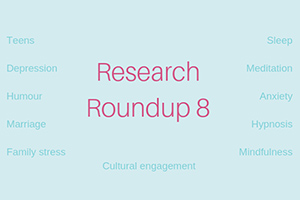
“Getting information off the Internet is like taking a drink from a fire hydrant.”
– Mitch Kapor
You, I, we’re all swamped in swathes of information. But as facts pile up, clogging our neuronal pathways, if we’re not careful we can end up feeling less knowledgeable and more confused.
I think this is because so many studies and snippets about the human condition are thrown at us out of context. Unless we have the time and capacity to see where information and new ideas fit together in the greater scheme of things, it can all seem very interesting, but not really help us understand ourselves and others and act effectively in the world.
We have information aplenty, but how can we actually use all this wonderful knowledge?
Every day, it seems, the media brings us some fresh new snippet about human nature. In this occasional series I take recent psychological research findings and try to place them into the bigger picture of what it means to be human.
I’m certainly not always right, and my ideas may be incomplete, but hopefully they help make a bit more sense of some important new information on what makes us all tick.
So what have I got for you this time?
This month’s gems
This time round we are briefly looking at:
- how teenagers’ responses to family stress can help or harm their physical health
- a simple way to guard against depression in older people
- the joys of getting older (in some ways!)
- the miraculous effects of a single session of mindfulness training, and
- how just 13 minutes of a hypnosis audio session can directly help people get much more of the all-important slow-wave sleep and (my take on) how that can help powerfully fight depression.
So, I hope there is at least something here to pique your interest, and maybe you can add your own thoughts. Let’s get on with it.
Research piece one: How teens deal with stress can affect their blood pressure and immunity
It’s hardly unusual for teens to get stressed out by their families now and then. But according to new research at Penn State, how they deal with that stress – whether they express their emotions or not, and whether they are able to see the situation in a positive light – may affect physiological processes in the body, affecting blood pressure and immune cell function.1
The researchers wanted to discover whether the strategies teenagers employ in response to chronic family stress influences their immune and metabolic function. In other words, does the way teenagers emote or perceive reality have biological effects?
They looked at such strategies as cognitive reappraisal (reframing), which means seeing the stressor in a more positive or flexible way, and suppression, or inhibition, of their emotional reaction to stress.
The research found that teenagers who reframe stressful family events, that is, put a positive spin on things, have healthier biological adaptations than those who simply suppress negative feelings. For example, they had lower blood pressure, smaller waist to hip ratio, and better immune function.
On the other hand, the adolescents who tended to bottle their feelings up and didn’t seek to see things differently tended to have more inflammation when their immune cells were exposed to bacteria in the lab.
Hannah Schreier, Assistant Professor of Biobehavioral Health at Penn State, conjectured that the emotional coping strategies teens use have the potential to impact their physical as well as mental health throughout life and may predict health in later life. This is amazing.
My take:
I see this as yet more evidence that the split between mind and body, emotions and biology, is an artificial one. Mind and body are as one. The way we experience and perceive reality doesn’t just impact how we feel and what we do but how well our body protects its vital organs and defends against disease!
Research has shown that trying to suppress a thought or feeling, particularly if it is emotive, can actually bring it back with a vengeance and magnify the very feelings we were trying to suppress.2,3,4 But the findings of this research suggest that overcoming negative feelings is not simply a question of expressing negative emotion, but actually reframing it.
I’ve written a book on reframing and I run an online course in conversational reframing, so to see evidence that having the capacity to reframe life situations and events can actually improve physical health in the short term – and probably the long term, too – is heartwarming.
Next, a way to potentially cut the risk of developing depression by 48%. Interested? Well if you’re over 50, or know someone who is, you should be.
Research piece two: Regular outings guard against depression in old age
A new study published in the British Journal of Psychiatry has found a clear correlation between cultural engagement and lower risk of depression. According to new research conducted at University College London, regular trips out to “cultural venues” such as cinemas, museums, or theatres may greatly reduce the probability of becoming depressed for people over 50.5 Yes, I know, I don’t see being 50 as “old age” either but you’ll just have to take that up with the authors of the study.
Anyway, the researchers found that increased frequency of “cultural engagement” could not just help people recover from and manage depression but even help to prevent it.
People who attended films, plays, or exhibitions every few months were found to have a 32% lower risk of developing depression than those who did not. And if they went at least once a month, their risk was 48% lower.
I know what you’re thinking! But even when results were adjusted to take account of differences in people’s wealth, physical health, exercise levels, education, and even gender, the benefits of cultural activities remained strong and clear.
My take:
The kinds of cultural activities this study focused on might not appeal so much to younger people. But the wider pattern of engaging with the community and connecting with something larger than the self are both vital primal needs which help us build a sense of meaning. So one person’s ideal “cultural activity” may differ from another’s.
Going out and doing something and focusing outside is antidepressant. Research shows that regularly experiencing a sense of awe, an appreciation for a sense of the profound, has been correlated with feeling happier.6 The authors of this research on awe describe how awe “expands people’s perception of time, alters decision making, and enhances well-being.”
But apart from the awe we might experience from some cultural activities, there may be social benefits too, which can also enhance wellbeing. When we are with people we like or find stimulating we tend to feel happier.7
And talking of feeling happier as we get older…
Research piece three: As married couples age, humour replaces bickering
Sniping and bickering may mark the early and middle years of a long-lasting relationship, but it seems as time goes by humour starts to replace these kinds of interactions.
Researchers studied videos of conversation between 87 middle-aged and older couples who’d been married for 15 to 35 years.8 Their emotional interactions were tracked over 13 years. It was found that, over time, couples in long-term relationships tended to show more tenderness and humour towards one another.
Published in the journal Emotion, these findings show that over the years couples tend to experience an increase in positive emotions towards one another and a decrease in negative actions, such as criticism and defensiveness.
It’s long been believed that there is a kind of plateau or deterioration in emotion as people age, but this research seems to challenge that and suggest that there is often a positive emotional trajectory for married couples in the long term.
My take:
People often fear getting older but, happily, there do seem to be some consolations. Contrary to how we imagine ageing might be, it seems that, generally, we grow happier as we age.9
Younger people may be on the lookout for great big extraordinary experiences to make them happy, which means less opportunity for happiness. But as people get older, ordinary everyday experiences become increasingly associated with happiness. We get more pleasure out of the little things. And perhaps so too with long term relationships. When the passions die down, the smaller pleasures between partners can be appreciated and enjoyed more fully.
There is hope for us all! Mind you, we can all learn to be happier and more relaxed at any age – which is a rather obvious segue to the next research piece.
Research piece four: Just one session of mindfulness meditation can lessen anxiety
Recent research suggests that we can start to reap the psychological and physiological benefits of mindfulness meditation after just one session.
Researchers found that an hour after just one introductory session of mindfulness training participants prone to anxiety were significantly more relaxed and therefore less anxious.10 Not only that, but a week later they were still less anxious – after just the one session.
Lead author John J. Durocher PhD, an assistant professor of physiology in the department of biological sciences at Michigan Technological University, said “[p]articipants also had reduced mechanical stress on their arteries an hour after the session. This could help to reduce stress on organs like the brain and kidneys and help prevent conditions such as high blood pressure.”
So not only can anxiety be greatly helped by mindfulness meditation, but so can physical health (which tends to be a side benefit of all relation techniques).
My take:
Over the years, I have seen the benefits of using deeply relaxing hypnosis for anxious clients firsthand. Apart from the skills you teach and the techniques you use while the client is deeply relaxed, the medium through which you work with them, the deep relaxation itself, helps lower anxiety and improve mental and physical health.
Like hypnotic work, mindfulness training can help people feel more safe and secure, and also more in control of their minds and lives. Feeling safe and having a sense of control are two vitally important primal human needs, so it’s no wonder people feel better when they relax and find ways to control their consciousness better.
I think hypnotic skills like mindfulness should be taught more broadly to help people manage their minds, which also means their bodies, better.
And if you needed any more reason to get excited about the possibilities of hypnosis, check out this last piece of research.
Research piece five: Hypnosis lengthens and deepens restorative slow-wave sleep
In a study published in the scientific journal Sleep, researchers from the Universities of Zurich and Fribourg have shown that hypnosis can greatly aid the quality of sleep.11
Seventy subjects at a sleep lab listened to a 13-minute hypnosis audio recording before sleeping. Some respondents increased their time spent in deep sleep by as much as 80%! Just after listening to 13 minutes of hypnosis audio. The researchers ruled out other potentially influential factors, such as expectancy before falling asleep. They did this in part by asking participants whether they believed their sleep composition would change.
Björn Rasch, the biopsychologist who headed the study at the Psychological Institute of the University of Zurich in conjunction with the “Sleep and Learning” project, said this finding “opens up new, promising opportunities for improving the quality of sleep without drugs.”
Slow-wave sleep (SWS) is extremely important because it’s during this part of sleep that our physical and mental restoration takes place. SWS strengthens the immune system in particular, helping us fight disease.
SWS also aids memory and restores our energy. It’s during periods of the delightful and restful SWS that growth hormones are secreted, promoting cell repair in muscle, bone and other tissues so that the wear and tear of our daily lives can be tended to and healed.
On the flip side, loss of SWS may make us exhausted and slow to heal, deplete our immune function, and maybe even increase the risk of type 2 diabetes.12
My take:
Not all sleep is created equal. It’s not just how much sleep you get that’s important, but what type of sleep your unconscious hours are composed of.
When we sleep at night we alternate between stages 1, 2, 3, and 4, of SWS and REM or ‘dream sleep.’ Dreaming is vital for our sanity,13 but it is much less physically restful than SWS. In fact, REM sleep is known as ‘paradoxical sleep’ because during REM brainwave patterns and blood pressure levels are very similar to when we are awake.
Deep SWS is how we become physically restored. Depressed people over-dream14 and therefore wake up exhausted through lack of restorative SWS, as well as the direct effects of over-dreaming.15
Hypnosis is a method that can enable us to influence processes that are very difficult to control voluntarily. We can use hypnosis to directly improve people’s’ sleep quality, not just quantity. Hypnosis therefore is an excellent tool to use for depression because it can directly influence the physical aspects of depression as well as the psychological.
I hope you found this useful, and I’d love to hear your comments on any or all of the issues covered here.
Helping a UPTV client resist sweet treats
This client has found herself uncontrollably eating sweet stuff since she became a mother. She seems to link it to the desire for comfort and it happens when she feels stressed and unattractive.
This client doesn’t really take ownership for buying the sweet stuff (although her husband also brings sweets into the house). Mark seeks to disrupt the pattern through “scrambling” it. He wants her to get in touch with the unpleasant effects of the sweet binging which she can do quite readily.
Mark also seeks to help her eating be more mindful in future by encouraging her to listen to the real needs of her body in times of temptation. He also works a little on her self-esteem as far as her appearance is concerned. Members of Uncommon Practitioners TV can watch this session now, and if you’d like to join, you can sign up here to be notified when UPTV is open for booking.
Notes:
- https://insights.ovid.com/crossref?an=00006842-201810000-00010
- http://psycnet.apa.org/doiLanding?doi=10.1037%2F0022-3514.53.1.5
- https://www.ncbi.nlm.nih.gov/pubmed/10751965
- https://www.ncbi.nlm.nih.gov/pubmed/9866186
- https://www.cambridge.org/core/journals/the-british-journal-of-psychiatry/article/cultural-engagement-and-incident-depression-in-older-adults-evidence-from-the-english-longitudinal-study-of-ageing/F25368CA79340C430B046A1DDDDC05B6
- https://journals.sagepub.com/doi/10.1177/0956797612438731
- https://www.mayoclinic.org/healthy-lifestyle/stress-management/in-depth/social-support/art-20044445
- http://psycnet.apa.org/doiLanding?doi=10.1037%2Femo0000551
- https://academic.oup.com/jcr/article-abstract/41/1/1/1810271?redirectedFrom=PDF
- www.sciencedaily.com/releases/2018/04/180423135048.htm
- https://academic.oup.com/sleep/article/37/6/1143/2416924
- https://www.pnas.org/content/105/3/1044.short
- See the excellent Dreaming Reality: How Dreaming Keeps Us Sane, or Can Drive Us Mad by Joe Griffin: https://www.amazon.co.uk/Dreaming-Reality-Keeps-Sane-Drive/dp/1899398910
- https://www.sciencedirect.com/science/article/pii/S1087079212001207
- https://www.clinical-depression.co.uk/dlp/understanding-depression/understanding-depression/










